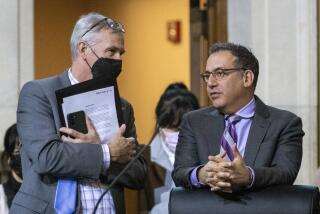14,000 Peacekeepers OKd for Yugoslavia : United Nations: Under a unanimous Security Council decision, most of the troops will be deployed to risky zones of Croatia.
- Share via
UNITED NATIONS — The Security Council voted unanimously Friday to authorize the dispatch of almost 14,000 United Nations peacekeepers, including about a dozen infantry battalions, to monitor the cease-fire in Yugoslavia. But a budget snag will keep all but an advance party of unspecified size from the bloodied and ethnically divided Balkans for the time being.
Once all the Blue Helmets, as U.N. troops are known, are deployed, chiefly in Croatia, they will head into a dangerous, sensitive situation; there is a fear that, at some point, the separatist republic of Croatia could provoke a crisis by asking the peacekeepers to depart or that the cease-fire could be broken in the Serbian enclaves within Croatia.
Despite this potential problem, the Security Council decided to break precedent and authorize the troops anyway.
In doing so, the council accepted the advice of Secretary General Boutros Boutros-Ghali, who had told the members in a report: “I have come to the conclusion that the danger that a United Nations peace-keeping operation will fail because of lack of cooperation from the parties is less grievous than the danger that delay in its dispatch will lead to a breakdown of the cease-fire and to a new conflagration in Yugoslavia.”
As soon as the resolution was passed in a brief, open council session, U.S. Ambassador Thomas R. Pickering, who is the group’s presiding officer this month, told reporters, “We hope for the development of a successful peace in Yugoslavia.”
Passage of the resolution authorizing the peacekeeping force had been delayed because of an argument over the cost.
Boutros-Ghali had budgeted the operation at $634 million for the first 12 months, including $132 million to house troops. But Pickering and the Russian and British ambassadors objected. They reportedly questioned why the Yugoslavs were not providing free or inexpensive housing.
“Being the largest contributor,” Pickering told reporters, “we at least have the largest concern.”
In the end, the council skirted the problem by omitting any budget estimate from the resolution.
Instead, the measure asks the secretary general to develop a new cost-efficient budget. Until he does so, only a part of the peacekeeping force will be dispatched; the full complement will follow once the budget is approved.
In most of its past peacekeeping operations, the United Nations has refused to send troops into an area until a cease-fire was assured and all sides had agreed to the U.N. presence. In the Yugoslav case, the cease-fire, brokered by former Secretary of State Cyrus R. Vance and former British Foreign Secretary Lord Carrington, has proven fragile; the ethnic conflict has proven far more complex than have many other civil wars elsewhere in the world.
Although Croatia has successfully broken away from Yugoslavia and won significant diplomatic recognition, its Serbian enclaves are largely in the hands of Serbian militias supported by the Yugoslav federal army. There is a fear among these Serbs that the U.N. peacekeeping operation will take away what they have won in battle. Milan Babic, one outspoken Serbian leader in an area known as the Krajina, has insisted that he will not cooperate with the United Nations.
In the past, the United Nations has accepted the principle that it will withdraw from a peacekeeping operation if any of the parties to the dispute ask the world body to leave. But, in this operation, the U.N. intends to operate under a different principle--it will remain until the Security Council decides it is time to go.
Under the U.N. plan, the peacekeepers are to take over positions from the Yugoslav army and disarm Serbian militia units in Croatia. It is assumed that this will ease the way for the parties to negotiate a permanent peace settlement. The bulk of the forces will be stationed in three areas of Croatia with large Serbian populations: eastern Slavonia, western Slavonia and the Krajina.
As outlined by Boutros-Ghali, the U.N. operation will include 12 enlarged infantry battalions of 10,400 troops, logistics and support personnel numbering 2,800, 100 military observers, 530 police and an unspecified number of civilians with what the secretary general called “political, legal, information and administrative functions.” The U.N. force also will have an air unit of four planes and 26 helicopters.
The secretary general said the U.N. force would be headquartered in Sarajevo with sub-offices in Belgrade and Zagreb and a logistics base at Banja Luka. The United Nations has asked 31 countries to contribute troops. In an unusual move, Russia and France, both permanent Security Council members, are expected to supply troops.
The delay because of the budget is not expected to last long. Pickering said he expected the secretary general to have a new budget in two weeks. A Yugoslav diplomat professed no concern about the delay since “the political decision to send the forces has been made tonight.”
But the squabble seemed to reflect irritation by council members over the mounting costs of peacekeeping operations and over the failure of Boutros-Ghali’s staff to come up with a reduced budget in time for the vote on the resolution.
The delay was especially ironic in view of his plea for urgency. “I and my representatives have received many moving appeals from citizens of Yugoslavia that immediate United Nations deployment to their country is the only hope for an avoiding an even more destructive civil war than that which prevailed during the second half of 1991,” Boutros-Ghali said in his report to the Security Council.
More to Read
Sign up for Essential California
The most important California stories and recommendations in your inbox every morning.
You may occasionally receive promotional content from the Los Angeles Times.













